
Preface: In next generation of computing technology, perhaps this so called next generation has came. Any software or hardware design weakness will affected our daily life. It looks that man kind does not have choice, an intangible force push the world to that zone. The situations similar gravity in our earth.
Background: Parallel processing is a method in computing of running two or more processors (CPUs) to handle separate parts of an overall task. Breaking up different parts of a task among multiple processors will help reduce the amount of time to run a program. GPUs render images more quickly than a CPU because of its parallel processing architecture, which allows it to perform multiple calculations across streams of data simultaneously. The CPU is the brain of the operation, responsible for giving instructions to the rest of the system, including the GPU(s).
NVIDIA CUDA provides a simple C/C++ based interface. The CUDA compiler leverages parallelism built into the CUDA programming model as it compiles your program into code.
CUDA is a parallel computing platform and programming interface model created by Nvidia for the development of software which is used by parallel processors. It serves as an alternative to running simulations on traditional CPUs.
The CUDA Toolkit targets a class of applications whose control part runs as a process on a general purpose computing device, and which use one or more NVIDIA GPUs as coprocessors for accelerating single program, multiple data (SPMD) parallel jobs. Such jobs are self-contained, in the sense that they can be executed and completed by a batch of GPU threads entirely without intervention by the host process, thereby gaining optimal benefit from the parallel graphics hardware.
Vulnerability details (CVE[‑]2023[‑]25512, CVE[‑]2023[‑]25513 & CVE[‑]2023[‑]25514): NVIDIA CUDA toolkit for Linux and Windows contains a vulnerability in cuobjdump, where an attacker may cause an out-of-bounds read by tricking a user into running cuobjdump on a malformed input file. A successful exploit of this vulnerability may lead to limited denial of service, code execution, and limited information disclosure.
Official announcement: Please refer to the supplier announcement for details – https://nvidia.custhelp.com/app/answers/detail/a_id/5456